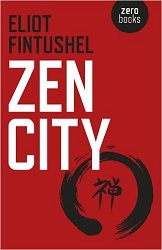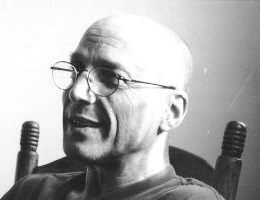by
Eliot Fintushel
(Zero Books, June 2016, pb, 125 pp.)
Reviewed by Dave Truesdale
I have been a fan of Eliot Fintushel’s work since his first published story in the late Algis Budry’s Tomorrow magazine, the fledgling magazine’s 5th issue cover dated October 1993. With a title like “Herbrand’s Conjecture and the White Sox Scandal” you knew you were in for something different.
From that first story Eliot has sold 41 others through 2012, and from 1993 through 2004 no fewer than 16 to Asimov’s with others scattered among such magazines as Amazing, Science Fiction Age, Tomorrow, Crank!, and Strange Horizons (with several being chosen for several Best Of collections). Taking time off to write his only full-fledged novel in 2007, Breakfast with the Ones You Love (Bantam Spectra), his short fiction output has taken a back seat for the past four years. Until now, and his long novella Zen City (packaged as a paperback short novel).
Fintushel’s fiction is difficult to pigeon-hole into any one sub-genre of science fiction or fantasy, for he mixes and matches elements of both to suit his own view of the world, which often is not quite like anyone else’s. Early in his career his fiction was likened to that of the late R. A. Lafferty, in that many of his stories ended up reading like tall tales, so wildly imaginative and with an internal logic of their own they defied categorization, yet delighted readers in such a way that their charm was impossible to resist (whether they fully understood what they’d just read or not). Such a reaction might very well prove to be the case with Zen City.
Zen City takes place in a post-collapse society where many live outside the City in old, rusted cars and vans and make do while studying to pass the strict tests allowing them entry into the City, where they believe they will be “enlightened” (the city representing the embodiment of the enlightened state) and will no longer be forced to live their hardscrabble lives in the wasted environs of the outside. While some eventually pass the criteria and are admitted to the City, never to be heard from again, others—including the protagonist, Big Man—attempt to sneak in, and this is where most of the story action takes place. All the strange goings-on are based on two ideas Fintushel has used before in short stories—hypostatting and hypodyning. Hypostat comes from the actual word hypostatize, which means to take some abstract idea to be an actual physical thing. In the world of Zen City, thoughts, ideas, or feelings are transformed into physical objects by means of a hypostatizing ray (or something, it doesn’t matter.) Hypodyne, on the other hand, is an invented word and the opposite of hypostat. (Static vs. dynamic.) Thus, you can hypodyne any physical being to make it into something abstract, non-substantial.
Successful applicants to the City are transferred into it by a combination of these two processes: first they lose their physical bodies through hypodyning, turning, as some of the characters say, “into jazz,” and then that “jazz” is hypostatted into the City, becoming part of the general condition of the City, without any personal self left. The “whaddayagets,” who live down in the caves, are the rejected experiments that led up to the city-making process of hypodyning and hypostatting—they are wild, crazy combinations of various feelings and ideas made together into weird fleshly creatures. One of them, for example, is a combination of weltshmerz, nooky, and genital crabs.
Everyone wants to get into the City because of the promise it holds, but many are rejected and must try over and over.
Big Man’s attempt to sneak into the City involves fragments of insider knowledge pieced together from hearsay; some reliable, some not—and possibly deadly. The obstacles he faces—both external and physical as well as emotional and mental—lead him on a journey which will change not only his life but those of others as well (including outsiders as well as those already in the City) as the philosophy of the Far East made real via advanced technology meets the materialistic world view of the West. Can they co-exist? Can the idealistic promises of both worldviews deliver? Are both viable in their own way? Are both hiding an ultimate lie? Zen City offers but one possible scenario and springs from the fertile imagination of its author, born in the West but spending many years in the East as a Zen student, and now through his fiction attempting to possibly reconcile these two wildly opposing world views.
The best advice I can offer any reader unfamiliar with Eliot Fintushel’s work is to give your imagination a thorough dusting off, and if your “suspension of disbelief” is a quart low, top it off before reading Zen City. And try to keep up.
♣ ♣ ♣
Dave Truesdale has edited Tangent and now Tangent Online since 1993. It has been nominated for the Hugo Award six times, and the World Fantasy Award once. A former editor of the Bulletin of the Science Fiction & Fantasy Writers of America, he also served as a World Fantasy Award judge in 1998, and for several years wrote an original online column for The Magazine of Fantasy & Science Fiction. Now retired, he keeps close company with his SF/F library, the coffeepot, and old movie channels on TV. He lives in Kansas City, MO.

 Zen City
Zen City